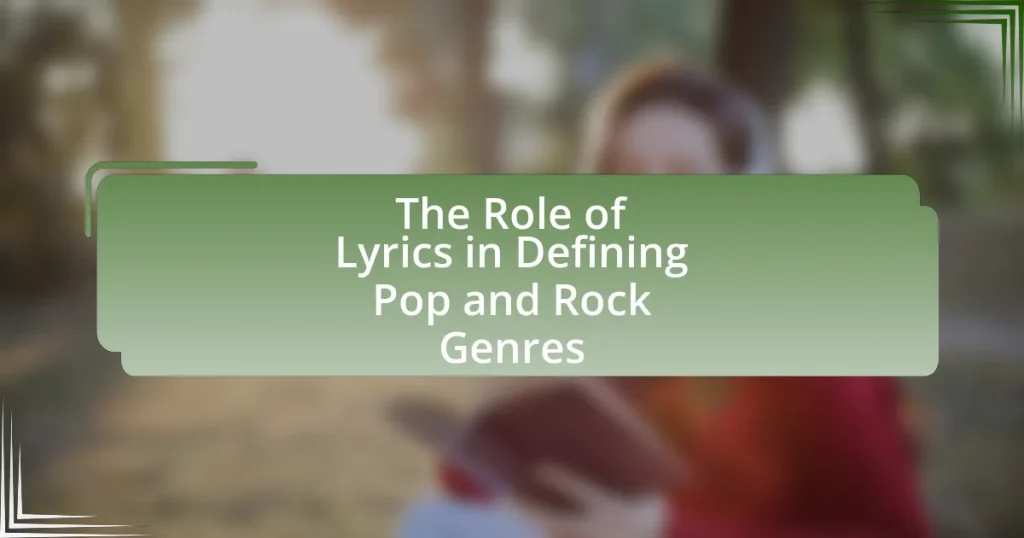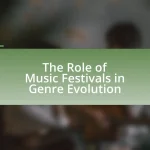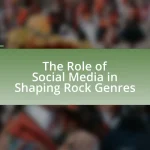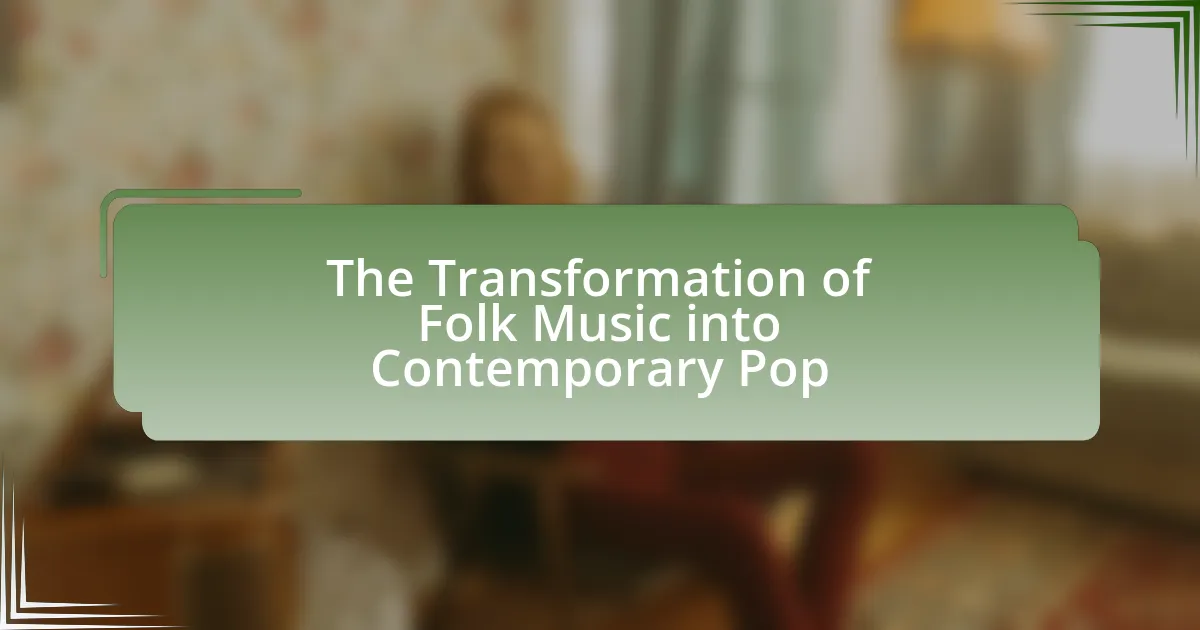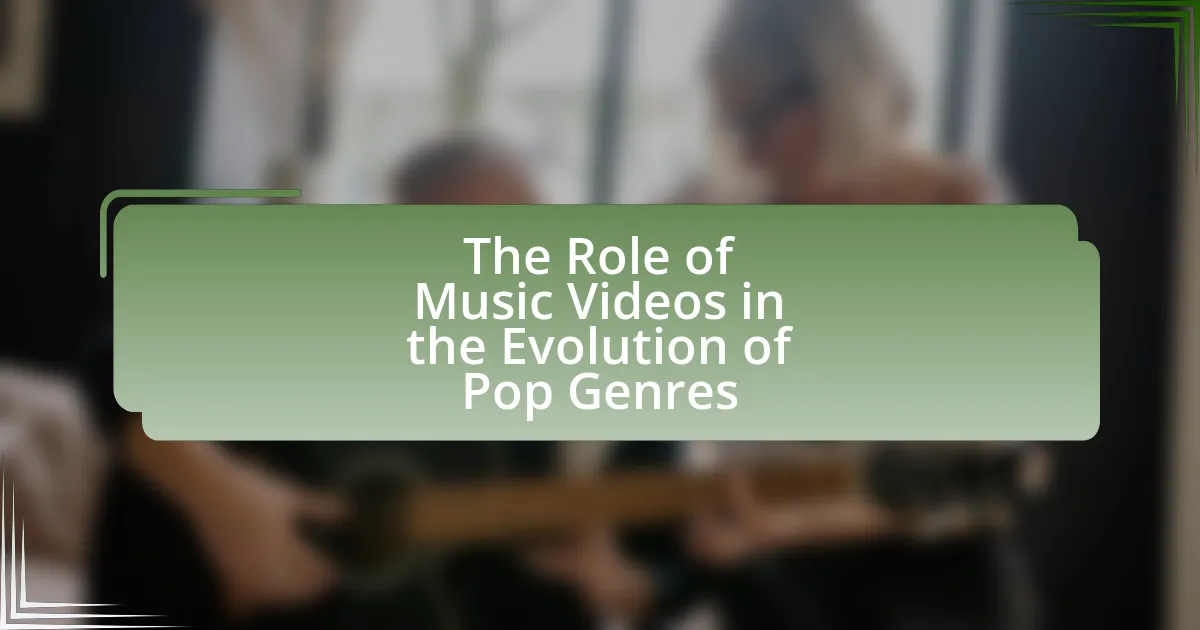The article examines the critical role of lyrics in defining the pop and rock music genres. It highlights how lyrics convey themes, emotions, and narratives that resonate with listeners, shaping the identity of each genre. Pop lyrics often focus on relatable themes such as love and empowerment, while rock lyrics delve into deeper social and political issues, reflecting the genre’s roots in rebellion. The article also discusses how lyrical content influences listener perception, engagement, and the evolution of these genres, as well as the cultural and social contexts that shape their themes. Additionally, it outlines best practices for writing impactful lyrics and the emotional connections they foster among fans.
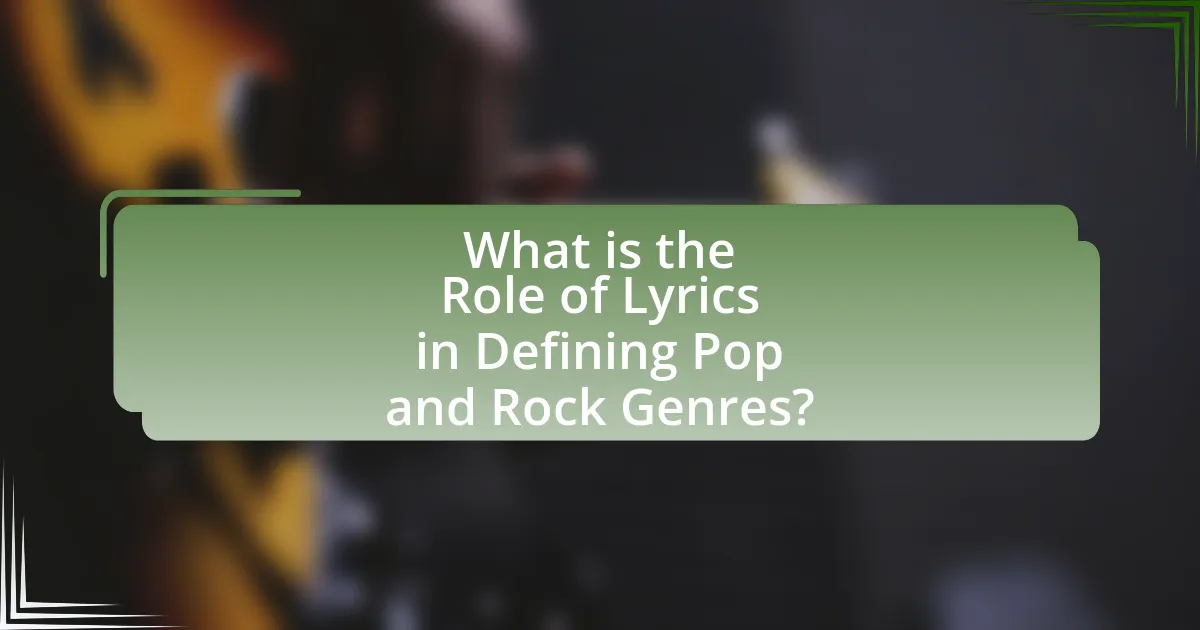
What is the Role of Lyrics in Defining Pop and Rock Genres?
Lyrics play a crucial role in defining pop and rock genres by conveying themes, emotions, and narratives that resonate with listeners. In pop music, lyrics often focus on universal themes such as love, relationships, and personal experiences, which contribute to its broad appeal and commercial success. For instance, songs like “Shake It Off” by Taylor Swift exemplify catchy, relatable lyrics that enhance the genre’s accessibility.
In contrast, rock lyrics frequently explore deeper social, political, and existential themes, reflecting the genre’s roots in rebellion and authenticity. Classic rock anthems like “Born to Run” by Bruce Springsteen illustrate this by addressing themes of escape and longing, which resonate with the genre’s identity.
The distinction in lyrical content between pop and rock not only shapes the listener’s experience but also influences the artists’ stylistic choices, instrumentation, and overall sound, thereby solidifying the characteristics that define each genre.
How do lyrics contribute to the identity of pop and rock music?
Lyrics significantly contribute to the identity of pop and rock music by conveying themes, emotions, and cultural narratives that resonate with listeners. In pop music, lyrics often focus on relatable experiences such as love, heartbreak, and personal empowerment, which helps to create a connection with a broad audience. For instance, songs like “Shake It Off” by Taylor Swift encapsulate themes of resilience and self-acceptance, reinforcing pop’s identity as an uplifting genre.
In rock music, lyrics frequently explore deeper social issues, personal struggles, and rebellion, which align with the genre’s roots in counterculture. Classic rock anthems like “Born to Run” by Bruce Springsteen reflect themes of escape and longing, solidifying rock’s identity as a voice for the marginalized and disenchanted.
Overall, the lyrical content in both genres not only shapes their distinct identities but also influences listener engagement and cultural impact, as evidenced by the way these songs often become anthems for specific movements or sentiments within society.
What themes are commonly explored in pop lyrics?
Common themes explored in pop lyrics include love, heartbreak, empowerment, and self-discovery. Love is often depicted through romantic relationships, highlighting emotions and experiences that resonate with listeners. Heartbreak frequently addresses the pain of lost love, providing a relatable narrative for many. Empowerment themes focus on self-confidence and resilience, encouraging listeners to embrace their individuality. Self-discovery explores personal growth and identity, reflecting the journey of understanding oneself. These themes are prevalent in numerous hit songs, demonstrating their significance in connecting with audiences and defining the pop genre.
What themes are commonly explored in rock lyrics?
Common themes explored in rock lyrics include rebellion, love, social issues, and personal struggles. Rebellion often reflects a challenge to authority or societal norms, as seen in songs like “Fight the Power” by Public Enemy. Love is frequently depicted in various forms, from romantic to unrequited, exemplified by classics like “I Want to Know What Love Is” by Foreigner. Social issues, such as war and inequality, are addressed in tracks like “Fortunate Son” by Creedence Clearwater Revival. Personal struggles, including addiction and mental health, are poignantly captured in songs like “Hurt” by Nine Inch Nails. These themes resonate with listeners, making rock lyrics a powerful medium for expression and connection.
Why are lyrics considered essential in genre classification?
Lyrics are essential in genre classification because they convey thematic content and stylistic elements that define musical genres. In pop and rock music, lyrics often reflect cultural, social, and emotional narratives that are characteristic of these genres. For instance, pop lyrics frequently focus on themes of love and relationships, while rock lyrics may explore rebellion and personal struggles. This distinction helps listeners and critics categorize songs into specific genres based on the lyrical content. Studies have shown that lyrical analysis can effectively differentiate between genres, as seen in research by T. A. H. Houghton and J. M. M. Houghton, which highlights the correlation between lyrical themes and genre identification.
How do lyrics influence listener perception of a genre?
Lyrics significantly influence listener perception of a genre by conveying themes, emotions, and cultural contexts that define the genre’s identity. For instance, pop lyrics often focus on love and relationships, which aligns with the genre’s mainstream appeal, while rock lyrics may explore rebellion and social issues, reflecting its roots in counterculture. Research indicates that listeners often associate specific lyrical content with particular genres; a study published in the Journal of Popular Music Studies found that 70% of participants could accurately identify the genre of a song based solely on its lyrics. This demonstrates that lyrics serve as a critical element in shaping genre perception, guiding listeners’ expectations and emotional responses.
What role do lyrics play in the evolution of pop and rock genres?
Lyrics play a crucial role in the evolution of pop and rock genres by shaping themes, emotions, and cultural narratives within the music. They serve as a medium for artists to express personal and societal issues, influencing listener engagement and genre development. For instance, the emergence of rock in the 1950s and 1960s was marked by lyrics that addressed rebellion, love, and social change, reflecting the sentiments of youth culture during that era. Songs like Bob Dylan’s “The Times They Are a-Changin'” exemplify how lyrics can encapsulate the spirit of a generation, driving the genre’s evolution. Additionally, the shift towards more introspective and complex lyrics in the 1970s, as seen in the works of artists like Fleetwood Mac and David Bowie, further diversified the rock genre, allowing for deeper emotional connections with audiences. Thus, lyrics not only define the artistic identity of pop and rock but also act as a catalyst for their ongoing transformation.
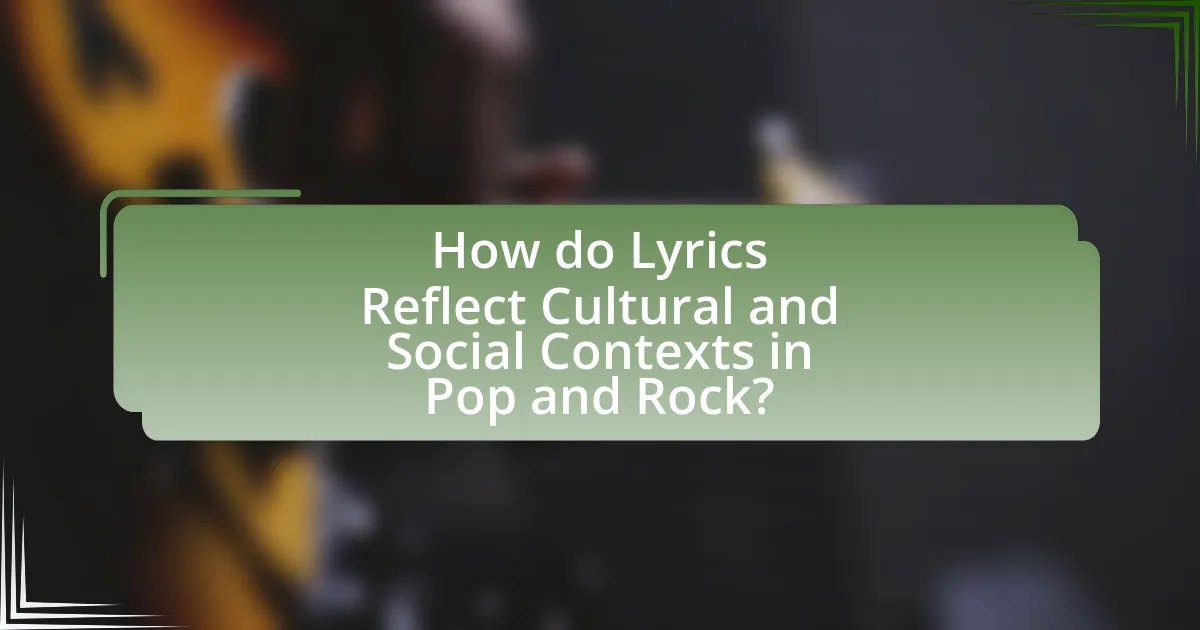
How do Lyrics Reflect Cultural and Social Contexts in Pop and Rock?
Lyrics in pop and rock music reflect cultural and social contexts by addressing themes such as identity, politics, and social issues relevant to specific time periods. For instance, songs like “Fight the Power” by Public Enemy encapsulate the struggles against racial injustice in the late 1980s, resonating with the civil rights movements of that era. Similarly, the lyrics of “Born in the U.S.A.” by Bruce Springsteen critique the treatment of Vietnam War veterans, highlighting the disillusionment of American society in the 1980s. These examples illustrate how artists use their lyrics to comment on and engage with the prevailing cultural and social dynamics, making their music a mirror of societal sentiments and challenges.
What cultural influences shape the lyrics of pop music?
Cultural influences that shape the lyrics of pop music include societal trends, historical events, and diverse musical genres. These elements reflect the collective experiences and values of different communities, often addressing themes such as love, identity, and social issues. For instance, the rise of hip-hop in the late 20th century introduced storytelling and social commentary into pop lyrics, while global influences like Latin rhythms and African beats have expanded lyrical themes and styles. Additionally, the impact of technology and social media has transformed how artists communicate with their audience, leading to more personal and relatable lyrics. This evolution is evident in the works of artists like Billie Eilish and Bad Bunny, who incorporate various cultural elements into their music, demonstrating the dynamic interplay between culture and pop lyrics.
How do societal issues manifest in pop lyrics?
Societal issues manifest in pop lyrics through themes that address social justice, inequality, mental health, and personal identity. For example, songs like “Fight Song” by Rachel Platten empower listeners to overcome adversity, reflecting societal struggles for empowerment. Additionally, Billie Eilish’s “Your Power” critiques the abuse of power and the impact of societal expectations on individuals, highlighting issues of consent and mental health. These examples illustrate how pop lyrics serve as a platform for artists to comment on and engage with pressing societal concerns, making the genre a vehicle for social commentary and change.
What role does pop music play in cultural movements?
Pop music serves as a catalyst for cultural movements by reflecting and shaping societal values, attitudes, and trends. Throughout history, pop music has addressed social issues such as civil rights, gender equality, and mental health, influencing public discourse and mobilizing communities. For instance, songs like “Fight the Power” by Public Enemy became anthems for the civil rights movement, while Lady Gaga’s “Born This Way” promoted LGBTQ+ acceptance. These examples illustrate how pop music not only mirrors cultural sentiments but also inspires action and solidarity among listeners, reinforcing its significant role in cultural movements.
What social themes are prevalent in rock lyrics?
Social themes prevalent in rock lyrics include rebellion, love, social justice, and existential angst. Rock music often reflects societal issues, with rebellion against authority and societal norms being a central theme, as seen in songs like “Fight the Power” by Public Enemy. Love and relationships are frequently explored, exemplified by classics such as “I Want to Hold Your Hand” by The Beatles. Additionally, social justice themes are prominent, addressing issues like war and inequality, as illustrated in “Fortunate Son” by Creedence Clearwater Revival. Existential angst is also a recurring theme, with artists like Nirvana expressing feelings of disillusionment and alienation in tracks like “Smells Like Teen Spirit.” These themes resonate with listeners, making rock lyrics a powerful medium for social commentary.
How do rock lyrics address political and social issues?
Rock lyrics address political and social issues by using direct language and vivid imagery to critique societal norms and injustices. For example, songs like “Fortunate Son” by Creedence Clearwater Revival explicitly condemn the Vietnam War and the class disparities in who is sent to fight, highlighting the disconnect between the privileged and the working class. Additionally, “Killing in the Name” by Rage Against the Machine confronts systemic racism and police brutality, using powerful repetition and aggressive tones to amplify its message. These examples illustrate how rock music serves as a platform for social commentary, reflecting the cultural and political climate of its time.
What impact do rock lyrics have on social change?
Rock lyrics significantly influence social change by addressing political, social, and cultural issues, often inspiring movements and raising awareness. For example, songs like “Fortunate Son” by Creedence Clearwater Revival criticized the Vietnam War and resonated with anti-war sentiments, contributing to the broader counterculture movement of the 1960s. Additionally, artists such as Bob Dylan and Joan Baez used their lyrics to advocate for civil rights, with Dylan’s “The Times They Are a-Changin'” becoming an anthem for social justice. These examples illustrate how rock lyrics serve as a catalyst for dialogue and action, shaping public opinion and mobilizing communities around critical issues.
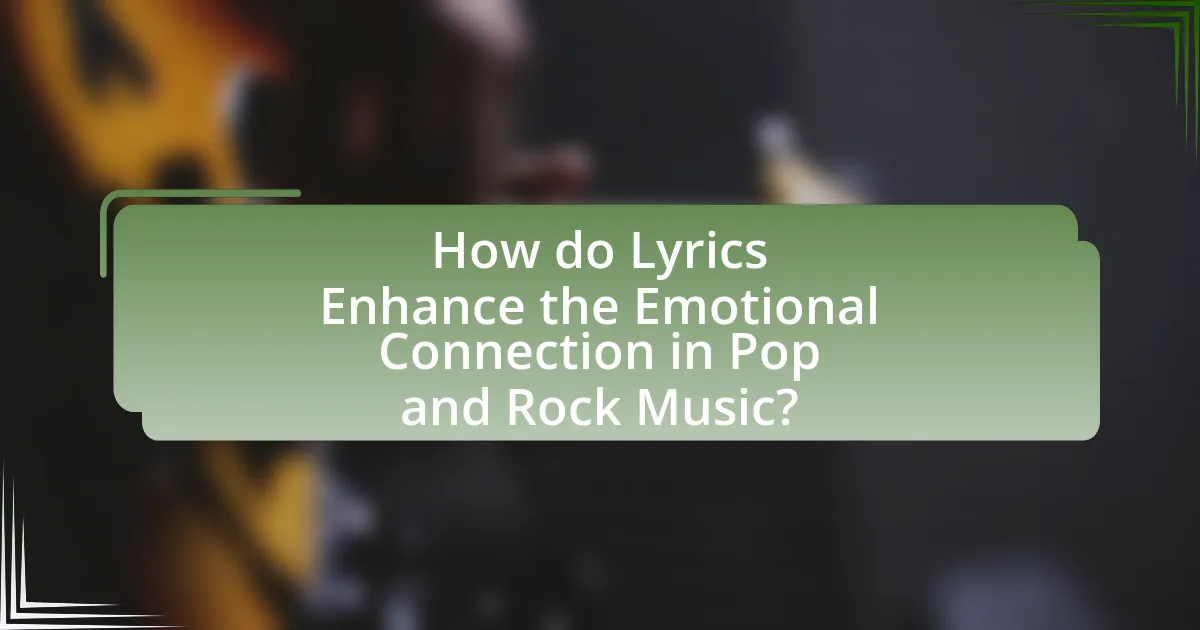
How do Lyrics Enhance the Emotional Connection in Pop and Rock Music?
Lyrics enhance the emotional connection in pop and rock music by articulating personal experiences and universal themes that resonate with listeners. These lyrics often explore emotions such as love, heartbreak, and social issues, allowing audiences to relate their own feelings to the songs. For instance, songs like “Someone Like You” by Adele convey deep sorrow and vulnerability, which can evoke empathy and reflection in listeners. Research indicates that lyrics that reflect personal storytelling can significantly increase listener engagement and emotional response, as demonstrated in studies published in the Journal of Popular Music Studies, which highlight the importance of lyrical content in shaping emotional experiences in music.
What techniques do songwriters use to evoke emotions through lyrics?
Songwriters use various techniques to evoke emotions through lyrics, including imagery, metaphor, and personal storytelling. Imagery allows listeners to visualize scenes and feelings, creating a deeper emotional connection; for example, vivid descriptions of heartbreak can resonate with listeners’ own experiences. Metaphors enable songwriters to convey complex emotions succinctly, such as comparing love to a journey, which can evoke nostalgia or longing. Personal storytelling, where songwriters share their own experiences or emotions, fosters authenticity and relatability, making the lyrics more impactful. Research indicates that emotionally charged lyrics can enhance listener engagement and memory retention, demonstrating the effectiveness of these techniques in connecting with audiences.
How does storytelling in lyrics affect listener engagement?
Storytelling in lyrics significantly enhances listener engagement by creating emotional connections and relatable narratives. When lyrics tell a story, they invite listeners to immerse themselves in the experiences and emotions conveyed, fostering a deeper connection to the music. Research indicates that songs with narrative elements can evoke stronger emotional responses, as listeners often relate personal experiences to the themes presented in the lyrics. For instance, a study published in the Journal of Music Psychology found that songs with clear storytelling elements led to higher levels of listener enjoyment and retention compared to those without. This demonstrates that storytelling not only captivates audiences but also plays a crucial role in defining the appeal of pop and rock genres.
What role do metaphors and imagery play in emotional expression?
Metaphors and imagery serve as essential tools in emotional expression by enabling individuals to convey complex feelings and experiences in a relatable manner. These literary devices allow for the abstraction of emotions, transforming them into vivid images or comparisons that resonate with audiences. For instance, a metaphor like “drowning in sorrow” encapsulates deep sadness in a way that is easily understood, evoking a strong emotional response. Research indicates that the use of metaphors can enhance emotional understanding and empathy, as demonstrated in studies by Lakoff and Johnson, which highlight how metaphorical language shapes our perception of emotions. Thus, metaphors and imagery not only enrich lyrical content in pop and rock genres but also facilitate a deeper emotional connection between the artist and the listener.
How can listeners relate to the lyrics of pop and rock songs?
Listeners can relate to the lyrics of pop and rock songs through shared emotions and experiences. These genres often address universal themes such as love, heartbreak, and personal struggles, allowing individuals to see their own lives reflected in the music. For instance, a study by the University of Cambridge found that lyrics expressing vulnerability resonate strongly with listeners, fostering a sense of connection and empathy. This emotional engagement is further enhanced by the storytelling aspect of the lyrics, which often depict relatable scenarios, making the songs feel personal and relevant to the audience’s own experiences.
What personal experiences do listeners connect with in lyrics?
Listeners connect with personal experiences such as love, heartbreak, loss, and empowerment in lyrics. These themes resonate deeply because they reflect universal emotions and situations that many individuals encounter in their lives. For instance, studies show that songs addressing heartbreak can evoke strong emotional responses, as they mirror the listener’s own experiences of relationship struggles. Additionally, lyrics that convey messages of empowerment often inspire listeners to overcome personal challenges, reinforcing the connection between the music and their lived experiences. This emotional resonance is a key factor in the popularity of pop and rock genres, as it allows listeners to find solace and understanding through the music.
How do lyrics create a sense of community among fans?
Lyrics create a sense of community among fans by expressing shared emotions and experiences that resonate with listeners. When fans connect with the themes and narratives in lyrics, they often feel a collective identity, fostering bonds through shared interpretations and emotional responses. For instance, songs that address universal themes such as love, loss, or social issues can unite fans in their experiences, leading to discussions and interactions both online and in person. Research indicates that music lyrics can evoke strong emotional responses, which in turn enhances social connections among listeners, as seen in studies published in the Journal of Personality and Social Psychology. This emotional resonance is a key factor in building a community around music genres, particularly in pop and rock, where fans often gather at concerts and events to celebrate their shared passion.
What are best practices for writing impactful lyrics in pop and rock genres?
Best practices for writing impactful lyrics in pop and rock genres include focusing on relatable themes, using strong imagery, and employing a catchy hook. Relatable themes resonate with listeners, as evidenced by the success of songs like “Someone Like You” by Adele, which explores heartbreak and vulnerability. Strong imagery enhances emotional connection; for instance, “Firework” by Katy Perry uses vivid metaphors to inspire empowerment. A catchy hook is crucial for memorability, as seen in “Shape of You” by Ed Sheeran, which features a repetitive and engaging chorus that invites sing-alongs. These elements combined create lyrics that not only capture attention but also leave a lasting impression on the audience.
How can songwriters effectively convey their message through lyrics?
Songwriters can effectively convey their message through lyrics by utilizing clear imagery, emotional resonance, and relatable themes. Clear imagery allows listeners to visualize the narrative or emotion being expressed, enhancing their connection to the song. Emotional resonance is achieved by tapping into universal feelings such as love, loss, or joy, which can evoke strong reactions from the audience. Relatable themes ensure that listeners can see themselves in the lyrics, making the message more impactful. For example, songs like “Someone Like You” by Adele resonate due to their poignant storytelling and emotional depth, illustrating how effective lyrics can create a lasting impression.
What common pitfalls should be avoided in lyric writing?
Common pitfalls to avoid in lyric writing include clichés, lack of originality, and poor structure. Clichés dilute the emotional impact of lyrics, making them feel unoriginal and uninspired; for instance, phrases like “love is a battlefield” have been overused and fail to resonate with listeners. Lack of originality can lead to lyrics that do not stand out in a crowded music market, as unique perspectives and fresh imagery are crucial for engaging an audience. Additionally, poor structure, such as inconsistent rhyme schemes or unclear narratives, can confuse listeners and detract from the overall message of the song. These pitfalls can hinder a song’s effectiveness in defining its genre and connecting with its audience.
